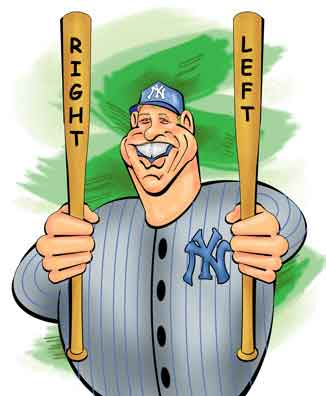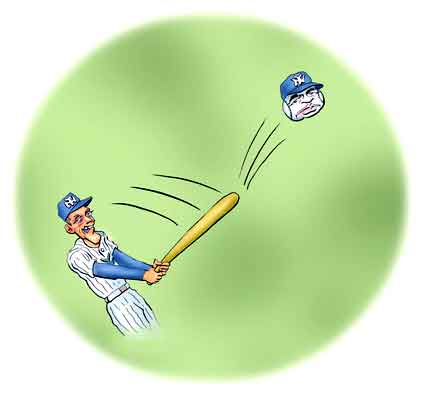Mickey Mantle
The Old Switcheroo

Mickey Mantle
(Click image to zoom in and out.)
Mickey Mantle was born in 1931 in Spavinaw, Oklahoma, and raised in Commerce. That's about five miles due north of Miami1 and about twenty miles west-southwest of the "big city" of Joplin, Missouri. Mickey graduated from Commerce High School where he was a top notch athlete.
Footnote
Miami, Oklahoma, of course.
The pronunciation of "Miami" in the local dialect is "my-AM-uh". A giveaway for a "furriner" - a word not in common use by the residents - is to pronounce the name "my-AM-mee".
Mickey worshipped his father, Elven, although it's no secret Elven - called "Mutt" by his friends - could be, well, strict even on his best of days. Mickey often told the story that once he had made it to the minors he was finding it tough going. Mickey called his dad and said he wasn't sure if he could make it. The team was within driving distance to Commerce and Mutt, who had played semi-pro baseball himself, said he'd be right there.
Instead hearing the pep talk he was expecting, Mickey was nonplussed to see his dad simply walk in and start tossing all of Mickey's clothes into a suitcase. Mickey asked his dad what was he doing. Elven just said he didn't know he had raised a quitter. Needless to stay Mickey stuck it out.
We see that like virtually all players, Mickey first played for the "farm clubs" - the minor league teams associated with a specific major league organization2. With Mickey, it was the Yankees' clubs, of course. In 1949 at age 17 he went to the Independence [Kansas] Yankees and then to the Joplin [Missouri] Miners before he was moved up to the Yankees in 1951. However, after a strong start he began to slump and was sent back to the Kansas City Blues.
Footnote
Since 1965 only 21 players have skipped the farm clubs and gone directly to the majors. Even the superstars - Jackie Robinson, Willie Mays, and yes, Mickey Mantle, usually had a stint in the minors.
Unfortunately, Mickey's playing picked up and he was called back to the Yankees in time to play in the 1951 World Series against the San Francisco Giants. Yes, unfortunately, he was called back.
In the second game of the series, Willie Mayes smacked a fly ball halfway between right and center. Mickey, playing right, ran to catch it, but Joe DiMaggio sprinted toward the ball and called for it. Mickey, deferring to his teammate who was a living legend, abruptly pulled up and caught his spikes on the cover of a drain pipe, tearing the ligaments of his knees. After surgery Mickey returned home and - surprisingly - was able to play the next year
The 1952 season was an opportune time. Joe DiMaggio had retired and the Yankees were rebuilding their batting power. It was a given that Mickey would step up to take Joe's place. That year he batted .311, knocked in 23 home runs, and had 87 RBIs. For the next sixteen years, Mickey played with the Yankees and in ten of those seasons batted above .300. His overall average was .298.

Roger Maris
In Competition
(Click image to zoom in and out.)
But it was his home runs that garnered Mickey his fame. His best years were 1956 when he hit 52 homers and 1961 when he smacked in 54.
It was also in 1961 that Mickey found himself in competition with his teammate Roger Maris for beating Babe Ruth's single season record of 60 home runs. Mickey was the favorite but illness and injury took him out of serious contention. By the last game of the season Roger had tied the Babe.
In Roger's first time up, he popped a fly to left field. He was out. Then at his second at-bat he let the first two pitches go by. The third pitch, though, - a fastball - Roger smacked into the bleachers3.
Footnote
A point of controversy was that in 1961 the number of games had just been upped from 154 to 162, and Commissioner Ford Frick had been adamant that anyone beating the Babe had to hit 61 homers in 154 games or less. But the public - and later the asterisked-qualified record books - accepted Roger as besting the Babe.
How much the extra-game advantage has affected Roger's legacy isn't clear. Although honored as a great player, Roger has never been elected to the Baseball Hall of Fame.
Mickey was a switch hitter - that is he batted either left handed or right handed depending on the handedness of the pitcher. It's fair to say baseball scholars rate Mickey as the best switcher of all time.
As to why you would want be a switch hitter varies a bit with who's doing the explaining. One answer is a left handed batter can see the ball leave a right handed pitcher more clearly and vice versa. So the batter can better gauge the type of pitch that's coming4. Also a pitcher has more trouble trying to pitch inside to a batter who bats contrary to the pitcher's throw.
Footnote
Scientists who have studied the physics of baseball have pointed out that the time it takes the ball to leave the pitcher's hand to reach the batter is too short for the batter to actually gauge the ball's speed. Instead, the batter uses the pitcher's arm motion to determine what type of pitch is coming his way.
That the arm motion, not the actual ball, tips the pitchers hand is the logic behind the "change-up" pitch - in the early years called the "slow ball". A change-up is when the pitcher throws with the motion of the fast ball but uses a grip so that the ball's horizontal and vertical motions is like a fast ball but it travels more slowly - maybe 80 miles an hour compared to 90 mph or more for a fast ball. So with the batter cuing on the motion of the pitcher's arm thinks a fastball is coming and swings to soon.
The mid-fifties to early sixties were definitely Mickey's best years. He won the Triple Crown in 1956 - that is he led the league in batting average (.353), home runs (52), and runs batted in (130). He was also a formidable defensive player usually stationed in center field. But most people still think of Mickey as a slugger.
Although plagued by injuries and also living a party-filled lifestyle, from 1953 to 1968 Mickey played in every All-Star Game with the exception of 1963. Mickey ended his career with 536 home runs and three Most-Valuable-Player Awards. Only six years after he retired, he was inducted into the Baseball Hall of Fame.
Those were certainly the days, my friends - but not the days that were financially lucrative for the ball players. Virtually all of them had other jobs in the off-season and - Yankees short stop Phil Rizzuto worked in a clothing store and Roger Maris eventually went into the beer distribution business. So once Mickey retired he looked for new activities. He was, after all, only 37.
Mickey coached briefly for the Yankees, tried broadcasting, and also went into the insurance business (as did the famed quarterback of the New York Giants, Y. A. Tittle). Mickey also opened a chain of restaurants and wrote a number of books.
Then by the late 1970's a new industry appeared. That was (legalized) casino gambling and the casinos began hiring celebrities as "hosts" or "greeters". Retired professional athletes were a big drawing card.
There was a wee bit of a problem. For years - decades even - Americans had been told that gambling was bad. It was evil - a sin - and one denomination had even forbade their members to pray for success if they went to a casino.
If there's one thing everyone knows about the differences between absolute right and wrong is how flexible they are. A perfectly normal and even routine activity, well-accepted by all, can be banned and the - quote - "criminals" - unquote - can be hit with stiff fines and jail terms.
Then after a few decades it dawns on the legislators - usually when the get-tough-on-crime schmaltz gets too expensive or the politicians start getting caught in the activity themselves - that the government is imprisoning its citizens for no good reason. So the - quote - "criminal activity" - unquote - is made legal and might even become a virtue.
That was certainly true for gambling. Before 1900 gambling was legal almost everywhere and was a source of revenue particularly in the western United States. But as the towns became settled eventually the gambling halls were closed down. By 1911 gambling was illegal in every state and territory in the United States.
So things continued until 1931 when Nevada - which had banned gambling in 1910 - changed its mind again. With the lowest population of any state - 94,000 or 0.07% of the US population - the Nevada legislators decided the state needed to beef up its tax base. So for the next forty-six years Nevada was the only state where you could legally lay down a bet. With some exceptions - mostly horse racing - gambling remained forbidden in all other states.
Then in 1977 casino gambling was legalized in New Jersey and the next year the first Atlantic City casino opened. The water suddenly poured through the floodgates and today about half the states permit commercial casino gambling of some kind. Churches even began booking junkets for their parishioners, for crying out loud!
In 1983, Mickey accepted an offer from the Claridge Resort and Casino in Atlantic City. Although Mickey had minimal activity with the gambling side of the resort, Bowie Kuhn, the baseball commissioner, decided it would never do. Gambling was not something that Major League Baseball would have anything to do with.
Mickey was banned from baseball for life and could no longer be associated with any activities of the game. This lifetime ban ended two years later when a new commissioner, Peter Ueberroth, reversed Bowie's decision.
Mickey was known for saying, "If I had known I was going to live this long, I'd have taken better care of myself." Unlike many authentic quotes Mickey really said this. And it is true that Mickey's years of hard partying had taken it's toll and he died in 1995 at age 63 and two months after receiving a liver transplant.
References and Further Reading
The Last Boy: Mickey Mantle and the End of America's Childhood, Jane Leavy, Harper Perennial, 2011.
"Mickey Mantle", James Lincoln Ray, Society for American Baseball Research
"Mickey Mantle", Baseball Reference.
"Straight To The Majors: The Players Who Skipped The Minors On Their Way to Pro Careers", SB Nation, Wendy Thurm, February 4, 2012.
"Fastball, Slider, Change-up, Curveball - An analysis, John Walsh, The Hardball Times, December 20, 2007.
"Peter Ueberroth Recalls Reinstating Mickey Mantle and Willie Mays to Baseball", Bill Dwyre, The Los Angeles Times, March 24, 2015.